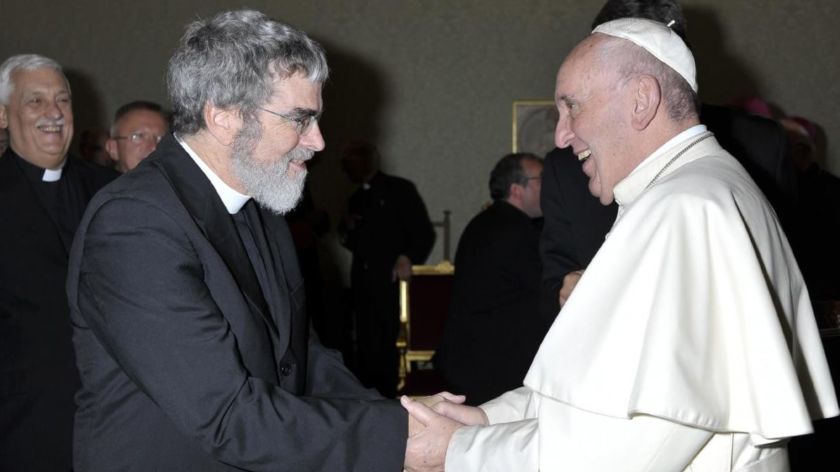‘No plans to baptise the martians’
-
 Guy Consolmagno (left) with the pope.
Guy Consolmagno (left) with the pope.
The head of the Vatican observatory is Jesuit Guy Consolmagno, who was born and raised in America. On Thursday, he visits Radboud University for a public lecture. Five questions we asked the director of Specola Vaticana, after whom an asteroid was named.
Why does the Vatican have its own observatory? Why is astronomy so important to the Vatican?
‘Well, first let me refute all the reasons you find on the internet. We are not casting horoscopes for the Pope, and we are not planning to go to Mars to baptise Martians! We don not even have anything to do with setting the date of Easter; that was settled back in 1582 by Pope Gregory XIII, who consulted Jesuit astronomers at that time on the topic. Instead, our mission is simply to do good cutting-edge science, to act as a bridge between science and the church, and to remind people (especially church people) that studying creation with science is a wonderful way of getting to know the Creator.’
What does the Vatican Observatory see as its greatest achievement?
‘Probably the most notable achievement was the formation of the Spectra Lab in the 1930s [with which stars’ color spectra can be registered and with that the most important characteristics of those stars, ed.], which led to the founding of the journal Spectrochimica Acta (now published by Elsevier). Our astronomers have also produced the standard tables of meteorite physical properties used by scientists around the world, and catalogues of stellar spectra that can be accessed on-line.’
What are you focusing on at the moment?
‘My work is focused on understanding the connections between meteorites in our lab and the asteroids or more distant bodies in our solar system where they come from. This involves both taking the physical property data I mentioned above; observing asteroids and trans-Neptunian objects with our telescope in Arizona; and devising theories to explain how we can connect what we see in one place, with what we see in the other. Science builds a cathedral of truth, brick by brick. Our task is to provide some good solid bricks. We do it for the love of the work, not for the desire of prizes or headlines.’
Astronomy has changed our view of the universe. What do you think will be the next revolution?
‘Ha! If I knew that, I’d be doing that. The most important thing in astronomy, or in any science, is to be prepared to be surprised. But I can say that, in my own field of planetary sciences, the biggest new opening has occurred because we now have thousands of solar systems around other stars to study and compare against our own. We’ve already been surprised to find that things we though were just ordinary in our solar system are in fact quite rare; it has shaken up a lot of things we used to take for granted. These are exciting times to be an astronomer!’
For a lot of people in the Netherlands it seems strange that you are a top scientist and religious at once. How do you unite these two?
‘I could give a long and deep answer; and indeed, I have written several books on the topic. Science is not memorizing facts in a textbook, religion is not memorizing verses in a Bible. It’s far more dynamic, and exciting, than that! Both are about the search for truth. Instead, I will turn the question around, this way: here I am, a Jesuit and a scientist. If you actually read the history of science you will find that that’s not unusual at all. And indeed, I have met many astronomers like me who are very active in their churches. That is a fact.’
Guy Consolmagno will give a lecture called ‘Astronomy in the Vatican’ on Thursday 8 December, in the collegezalencomplex. Consolmagno will also be speaker at the symposium about astronomy the next day, at the Linnaeus building.




Vaticanum Observatorium – Vatican Observatory – Specola Vaticana – Observatorio Vaticano – Observatório do Vaticano – Observatoire du Vatican – Vatikanische Sternwarte – الفاتيكان المرصد – Obserwatorium Watykańskiego – Vaticaanstad Observ schreef op 7 december 2016 om 17:40
[…] http://voxweb.nl/international/no-plans-to-convert-the-martians […]